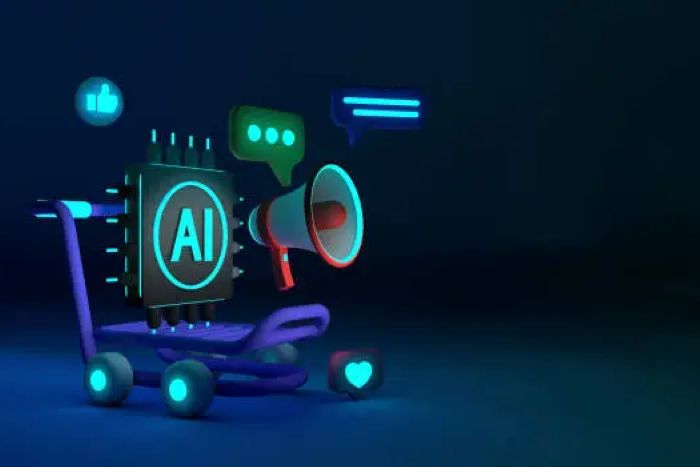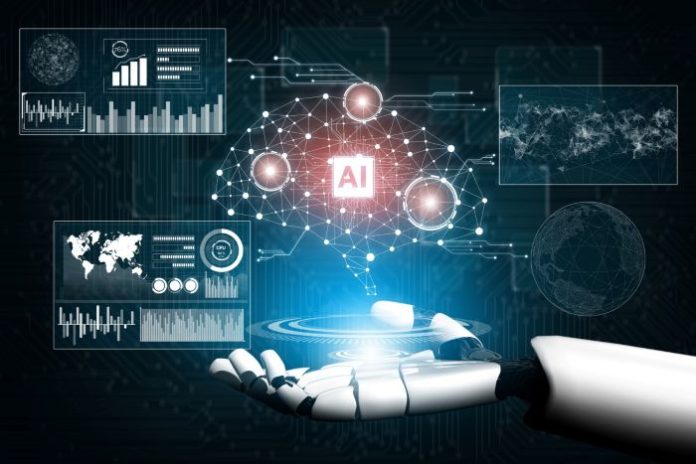AI and digital marketing are redefining online engagement by enabling businesses to tailor experiences to individual users, automate campaigns, and respond to customer needs in real-time.
In this article, we delve into how AI and digital marketing are redefining online engagement through tools like AI-driven chatbots, personalized recommendations, and predictive analytics that are revolutionizing digital marketing.
Key Takeaways
- AI and digital marketing enhance online engagement by personalizing experiences and automating tasks.
- Historical shifts in digital marketing, from clickable ads to social media, have transformed user interaction.
- AI tools, like chatbots and predictive analytics, enable real-time responses and tailored marketing strategies.
- Automation frees teams to focus on strategic initiatives, improving efficiency and effectiveness in campaigns.
- Addressing the ethical use of AI is essential for businesses to create meaningful customer experiences and thrive.
Table of Contents
The Evolution of Online Engagement
The late 1990s marked the birth of digital marketing with clickable web advertisements, initiating a new era of online engagement. The advent of Web 2.0 revolutionized this landscape, transforming users from passive consumers to active contributors through user-generated content and social interactions.
In the early 2000s, social media platforms like Facebook, Twitter, and LinkedIn emerged, offering brands new ways to connect with consumers. These platforms enabled real-time interactions, making social media management a vital part of digital marketing strategies to foster customer loyalty through targeted campaigns.

As consumer demand for personalized experiences grew, businesses shifted from static websites to dynamic, customized platforms powered by predictive marketing and real-time data. This enhanced user experiences and improved marketing campaign effectiveness by delivering relevant content aligned with market trends.
Understanding customer behavior became essential, with companies leveraging data-driven insights to tailor marketing messages and create valuable content that meets specific customer needs. From clickable ads to social media and personalized marketing, the journey of online engagement has evolved significantly.
Looking ahead, the integration of artificial intelligence into digital marketing and advertising promises to further transform how brands interact with their audiences, creating more meaningful and impactful customer experiences. For businesses navigating this shift, it has become essential to discover the best digital marketing agencies that can merge creativity with data-driven innovation.
AI as the New Driver of Digital Interaction
Artificial intelligence (AI) has become the powerhouse driving digital interaction, offering unprecedented personalization, automation, and real-time responsiveness. AI tools are transforming digital marketing by enabling businesses to engage audiences in ways previously unimaginable. From chatbots to recommendation systems and predictive analytics, generative AI leads this revolution, making customer engagement more efficient and effective.
A key contribution of AI is powering personalization. AI algorithms analyze vast consumer data to understand individual preferences and behaviors, allowing tailored experiences that resonate with audiences. AI-powered chatbots handle inquiries and provide real-time personalized product recommendations, enhancing engagement. These virtual assistants use natural language processing to seamlessly respond to customer needs.
Recommendation systems analyze browsing history and purchase patterns to suggest products likely to interest users. This personalization improves satisfaction and increases conversions. Companies also use tools like the best AI avatar generator to create immersive digital experiences, further boosting engagement.
AI revolutionizes marketing automation by:
- Automating routine tasks to reduce repetitive work
- Allowing marketing teams to focus on strategy
- Accelerating efficiency and productivity
- Enabling real-time adaptation to social media interactions and trends
Beyond automation and personalization, AI-driven analytics uncover insights from large datasets that human analysis might miss. Predictive analytics helps businesses anticipate customer behavior and tailor marketing strategies accordingly. Leveraging AI technology enables data-driven decisions that optimize marketing performance and fuel business growth.
Transforming Marketing Strategies with AI
The integration of artificial intelligence into marketing strategy is reshaping how businesses approach their marketing efforts. AI-driven strategies enable companies to create hyper-targeted campaigns that deliver relevant messages to specific audiences, resulting in more effective marketing outcomes. By leveraging AI, businesses can optimize their strategies and achieve better results.
A key advantage of AI in digital marketing is its ability to segment customers based on shared interests or behaviors. This segmentation allows tailored marketing messages that increase engagement and conversions. AI analytics uncover insights from large datasets that human analysis might miss, providing deeper audience understanding.
AI enhances marketing by:
- Analyzing search trends and identifying ranking opportunities to optimize campaigns in real-time.
- Helping businesses stay ahead by adapting strategies to emerging trends and customer preferences.
- Enabling data-driven decision-making and workflow automation, boosting efficiency, and showcasing AI expertise.
Financial benefits include:
- Increased efficiency and reduced costs through automation.
- Real-time insights that drive financial gains.
- Automatic bidding and real-time optimization in paid advertising to maximize ROI.
By leveraging AI, businesses achieve better results with fewer resources, making marketing efforts more efficient and impactful. AI’s role in paid advertising exemplifies its power to transform strategies and fuel growth.

Personalization at Scale with AI
Personalization is a cornerstone of effective digital marketing, with AI playing a pivotal role in delivering it at scale. By analyzing consumer behavior and leveraging data-driven insights, AI enables businesses to create experiences tailored to individual preferences, boosting engagement, conversions, and loyalty.
AI automates content personalization by analyzing consumer data and using predictive analytics to anticipate preferences, saving time and enhancing campaign effectiveness. AI-powered recommendation engines suggest products based on browsing and purchase patterns, further driving satisfaction and conversions.
Balancing data collection with consumer privacy is essential. Businesses must maintain transparency and protect privacy through clear policies, building trust while responsibly using AI.
Enhancing Customer Engagement
Customer engagement is vital for successful digital marketing, and AI significantly enhances the customer experience. AI-powered tools enable businesses to create personalized, interactive experiences that resonate with their audience, boosting satisfaction and loyalty.
AI chatbots are among the most effective tools, using natural language processing and machine learning to understand customer needs and improve responses. They handle queries, recommend products, and complete transactions in real-time, offering seamless, 24/7 support.
AI-powered sentiment analysis provides real-time insights from social media, allowing businesses to tailor interactions and respond to trends and feedback promptly. This personalization deepens engagement and improves customer satisfaction.
By automating routine tasks and handling inquiries, AI reduces the workload on human support teams, enabling them to focus on complex issues. Incorporating AI automation and technologies into customer engagement strategies demonstrates its power to enhance satisfaction and build long-term loyalty.
Predictive Analytics in Marketing
Predictive analytics is transforming marketing strategies by leveraging AI to analyze and forecast consumer behavior using real-time data. Advanced algorithms process diverse data to provide deeper insights into customer preferences, enabling businesses to anticipate needs and personalize campaigns effectively.
Integrating predictive analytics into marketing systems improves the accuracy of customer behavior forecasts. By using historical data to predict future actions, businesses can tailor their efforts to better engage audiences, boost conversions, and build loyalty.
Key benefits include:
- Enhanced audience segmentation by identifying patterns and trends for more precise targeting.
- Predicting customer trends to design focused marketing campaigns.
- Lead scoring to prioritize prospects based on the likelihood of purchase.
- Improved prioritization through analysis of engagement, demographics, and behavior.
Personalized email campaigns driven by predictive analytics achieve higher transaction rates by aligning content with customer preferences. Marketers can also anticipate emerging trends, optimize strategies, and maintain a competitive edge.
Additionally, predictive analytics enables tracking and refining marketing tactics based on individual responses. Leveraging AI-driven insights supports data-driven decisions that enhance marketing performance and drive business growth, providing a significant advantage in the digital marketing landscape.

Automating Marketing Tasks
AI plays a pivotal role in automating marketing tasks, boosting efficiency, and allowing teams to focus on strategic initiatives. By handling routine tasks, AI frees up valuable time and resources, transforming digital marketing and enhancing overall performance.
A major benefit is AI’s ability to analyze social media interactions instantly. AI tools monitor accounts, analyze interactions, and provide real-time insights, enabling businesses to adapt strategies quickly. This helps respond to trends and customer feedback, improving social media management and engagement.
In email marketing, AI:
- Automates audience behavior analysis and targets specific demographics.
- Uses AI-driven insights to craft personalized campaigns that drive conversions.
- Automates drafting, scheduling, and optimization of emails.
- Ensures messages reach the right audience at the right time.
AI platforms automate tasks from content creation to campaign optimization, improving returns and efficiency. This automation enhances accuracy and effectiveness, leading to higher ROI.
By automating routine work, marketing teams can prioritize high-impact activities that drive growth. Integrating AI into marketing automation demonstrates its power to transform strategies and boost performance.
Content Creation and Optimization
Content creation is a vital part of digital marketing, and AI is greatly improving this process. AI tools assist by recommending topics, automating publication, and generating content from prompts, saving time while ensuring relevance and engagement.
AI boosts SEO by:
- Optimizing content based on search trends and user preferences.
- Analyzing audience behavior.
- Creating SEO outlines from trending topics.
This helps businesses improve search rankings and attract organic traffic.
AI also revolutionizes content production by suggesting topics, automating drafting and scheduling, and maintaining brand consistency. AI-generated content enhances marketing strategies by identifying opportunities and optimizing performance, transforming how businesses engage their audiences.
Summary
The integration of AI and digital marketing is reshaping online engagement by enabling greater personalization, automation, and real-time responsiveness. From early clickable ads to social media and personalized experiences, AI now leads this transformation, enhancing marketing strategies and customer interactions.
AI-driven insights and predictive analytics help businesses craft targeted campaigns that boost conversions. Tools like chatbots and automated marketing improve efficiency, delivering better results with fewer resources. Addressing ethical challenges and ensuring responsible AI use remain essential.
Looking forward, the evolving AI and digital marketing landscape offers vast opportunities for innovation and growth. By balancing technology with human connection and ethics, businesses can create impactful customer experiences and thrive in the future.











